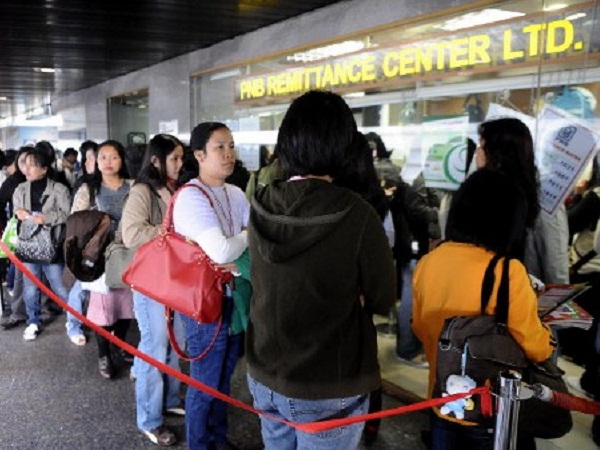
Filipino domestic helpers line up to send money at a remittance center in the central district of Hong Kong in this 2008 file photo. AFP/TED ALJIBE
Growth in remittances rose as expected in November as overseas Filipino workers (OFW) with families in the Visayas sent home more money to fund reconstruction efforts following Supertyphoon “Yolanda.”
The Bangko Sentral ng Pilipinas (BSP) reported on Wednesday that remittances for the month of November reached record high as improving economic conditions fueled higher demand for OFW labor, breaching $2 billion for the second straight month.
“The steady deployment of OFWs remained the key driver of growth in remittance flows,” BSP Governor Amando M. Tetangco Jr. said in a statement.
Remittances for November reached a record high of $2.063 billion, slightly higher than the $2.062 billion recorded the month before. The level for November was up 7.5 percent year on year, faster than the 7 percent the previous month.
This was the highest growth rate since January of 2013 when the amount of money sent home by OFWs rose by 8 percent.
For the 11 months ending November, cash remittances reached $20.6 billion, up 6.1 percent from a year ago. The BSP said remittances likely grew by 5 percent in 2013, although officials have said the forecast would probably be breached.
Last December, Tetangco said major natural calamities such as Yolanda, which devastated the Visayas last Nov. 8, have historically resulted in growth rates in remittances higher than what would be considered normal.
This was seen following tropical storm “Ondoy” and Typhoon “Pepeng” in 2008, which caused massive flooding in Metro Manila and Northern Luzon, respectively.
Citing data from the Philippine Overseas Employment Administration (POEA), the BSP said approved orders for OFWs stood at 731,254, of which 43.2 percent were processed job orders mainly for services, production, professional, technical and related workers.
These job orders were intended for the manpower requirements of Saudi Arabia, United Arab Emirates, Kuwait, Taiwan, Hong Kong and Qatar.
OFW remittances are the biggest source of foreign exchange income for the country. These flows are also a strong driver of domestic consumption, which contributes about two thirds of gross domestic product (GDP).
RELATED STORIES:
OFW remittances to increase by 8.5% in 2014—Standard Chartered
Remittances seen to calm markets, support peso

